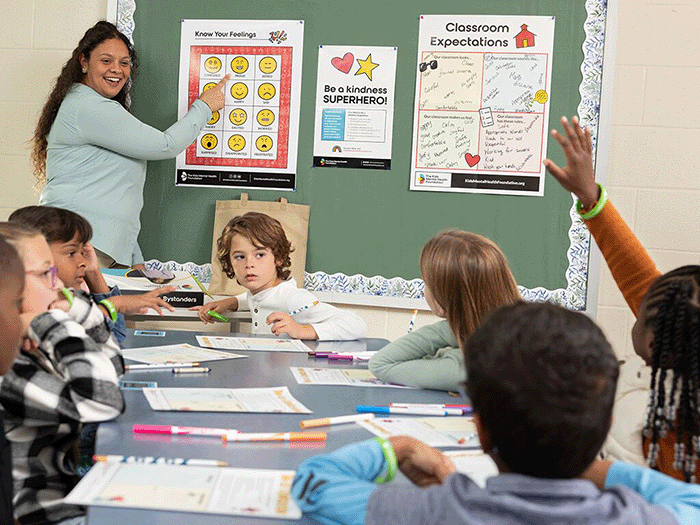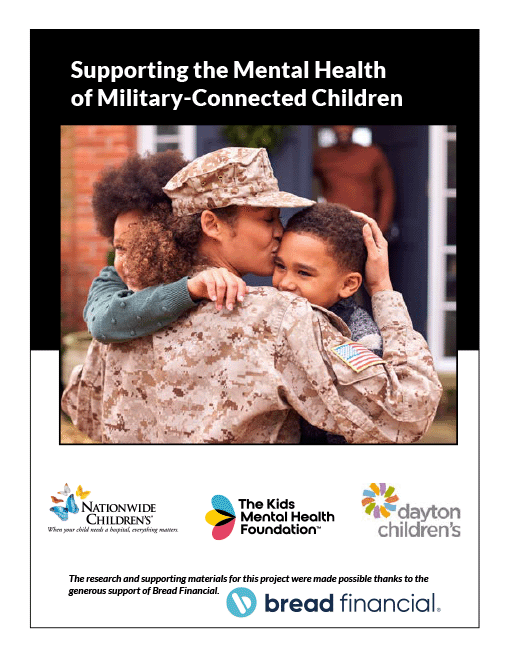Our Research
Rooted in Clinical Expertise, Designed for Everyday Use
At The Kids Mental Health Foundation, we believe mental health should be a vital part of every child’s upbringing. That’s why we offer free resources that adults can use to teach children mental health and wellness skills, before concerns become crises.
Our work is grounded in the latest research and clinical expertise from over 1,000 behavioral health professionals at Nationwide Children’s Hospital and partner institutions. We stay current with emerging trends and global conversations to ensure our materials reflect the support parents, caregivers, educators and coaches need the most.
Supporting Military-Connected Children
The Kids Mental Health Foundation, thanks to generous support from Bread Financial, produced a report about helping military-connected children with their mental health and wellness. Based on the research findings, new resources were created to help all adults – even those with no direct connection to the military – support children’s mental wellness to fill the gap in military-created resources.
Our needs assessment revealed:
- The focus of many materials around military-connected families is on mental health problems, not building up mental wellness in children.
- There are few materials specific to the mental health of military-connected children; most of the focus is on the service member and not on their children.
- There are limited resources for teachers and medical providers, few provide information on how they can be a protective factor for military-connected children, reduce stress when moving to a new place and how they can help the child build resilience.
Supporting Students’ Mental Health
The Kids Mental Health Foundation partnered with First Book, a nonprofit organization dedicated to ensuring education equity for children living in poverty, to conduct research into educators’ concerns about students’ mental health and well-being:
- 98% of educators say mental health challenges act as a barrier to children’s education.
- 85% of educators believe addressing mental health is a high or emergency priority in relation to other classroom or program priorities this year.
- 72% of educators say the pandemic has introduced new mental health challenges among students/children.
- 92% of educators indicated they are very or extremely interested in accessing support resources focused on promoting the general mental health and well-being of all students.
First Book and The Kids Mental Health Foundation created Taking Care: An Educator Guide to Healthy Habits for Student Emotional Wellness. This free guide for educators contains best practices and activities to optimize mental fitness and emotional resilience and decrease stress and anxiety. The activities in the Taking Care guide are meant to be paired with First Book’s books and resources featured on their Social & Emotional Learning page.
Mental Wellness in the Classroom
Based on teachers’ needs for additional resources, The Kids Mental Health Foundation created monthly Mental Wellness Teacher Kits. These monthly kits contain a lesson plan, activity and supplemental resources for the classroom. Topics range from bullying to trauma-informed care to test anxiety.
- Ninety-two percent of teachers reported that they observed a change in students’ behavior because of the skills gained from the kits, most noticing an increase in compassion and empathy.

We also send schools free Kindness Kits, which includes a lesson plan, posters, postcards and stickers for the classroom to teach children about ways to show kindness to others.
- 91% of participants agreed that the activities in the kindness kit were helpful or very helpful.
- 89% of survey participants agree or strongly agree that their students were more cooperative with peers after completing the kindness challenge.
Continue helping us make mental health a vital part of growing up.
Impact of Children’s Mental Health on Working Parents
The Great Collide
In our research report, “The Great Collide: The Impact of Children's Mental Health and the Workforce,” we examined the concerns and challenges parents face at work around their children’s mental health.
- Eight out of 10 working parents believe mental health challenges have increased in recent years – even before COVID-19.
- Six in 10 parents report being very or extremely concerned about their children’s emotional health and development within the past two years.
- Working parents feel distracted, emotionally drained, and worried about how to improve their children’s mental wellbeing, recognize potential warning signs, and seek care when necessary.
To address these needs, we developed Bloom, an online learning platform with videos and downloadable guides. Bloom empowers parents to navigate their children’s mental health effectively.
The Ripple Effect
In our follow up study, “The Ripple Effect: The Influence of Children’s Mental Health on The Great Resignation,” we found that:
- One-third of working parents report changing or quitting their jobs in the past two years because of their child’s mental health.
- 66% of Black/African American parents who expressed higher levels of concern for their child and whose work was disruption reported changing jobs or quitting working in the past two years because of a child's mental than compared to 51% of non-Hispanic White parents who also had expressed higher levels of concerns and work disruption.
- 38% of parents say their organization does not have a “family first” culture.
As a result of these findings, The Kids Mental Health Foundation created a discussion guide for employers to use with parents and caregivers in their organization.
